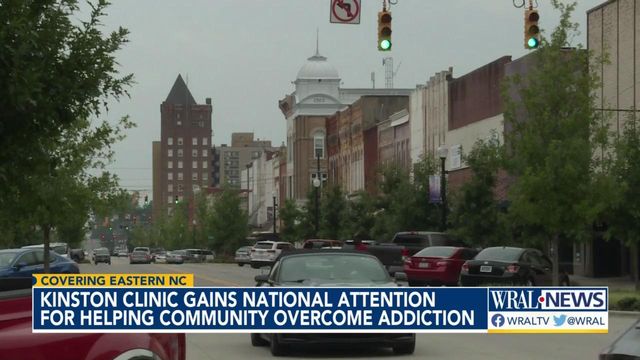Kinston treatment center changing how justice system treats behavior health nationwide
A doctor in Kinston has been named to a national organization looking to keep people suffering from addiction and mental illness in rural communities out of jail.
Posted — UpdatedThanks to a national organization, Rural Justice Collaborative, the Kinston Community Behavioral Health center could become a model for treatment nationwide.
“We treat them like a human first, just to see hey, what’s going on, how can we best help you?” said Kinston Community Behavioral Health director Dr. Brandy Harrell.
The Kinston Community Behavioral Health Center, a clinic looking to keep people struggling with mental health out of jail, and instead provide them with a caring environment.
“We are able to give them access to medical, dental, behavioral health, substance use treatment,” Dr. Harrell said. Women at the treatment centers also have access to an OBGYN.
The clinic currently treats more than 600 patients, including a partnership with the court system in Lenoir County that Dr. Harrell said has provided an alternative to prosecution for habitual drug users.
“Within the last few years we have seen a decrease in usage, also we’ve seen an increase in folks coming to access treatment,” Dr. Harrell said.
That partnership caught the eye of the Rural Justice Collaborative, a new undertaking from Rulo Strategies and the National Center for State Courts.
“The Rural Justice Collaborative is designed to offer learning opportunities and peer-to-peer connections for people who work in rural justice systems,” said Tara Kunkel, Rulo Strategies executive director.
Dr. Harrell has been selected to join the RJC, where she’ll have the chance to lend her experience to research efforts. The group hopes to present their findings to the federal government within the next three years, aiming to improve the way the justice system treats behavioral health in small communities across the country.
“Communities in other rural areas can actually replicate those programs, and help the citizens in their area,” Dr. Harrell said. “It’ll help folks stay out of prison because they can become productive members of society.”
The clinic said their next goals were to reach more patients and bring in new addiction treatment methods in the coming months.
Related Topics
Copyright 2024 by Capitol Broadcasting Company. All rights reserved. This material may not be published, broadcast, rewritten or redistributed.





